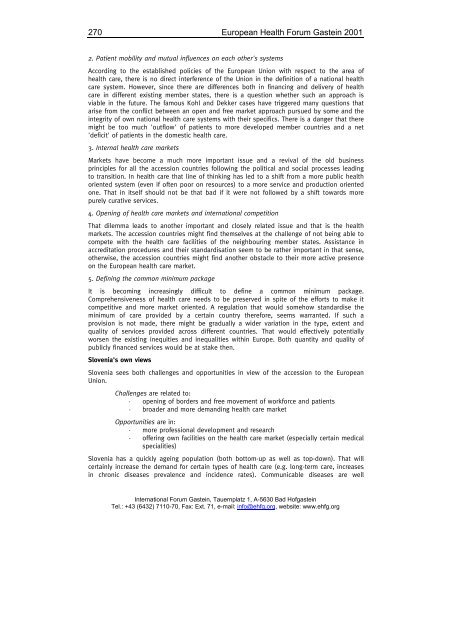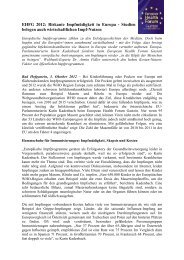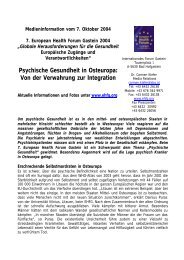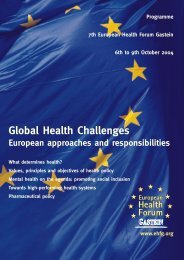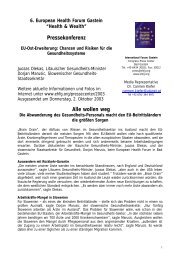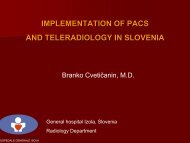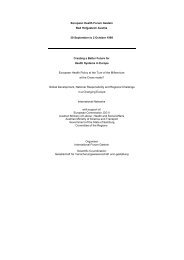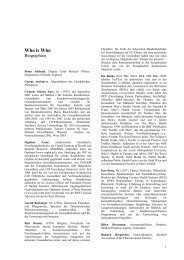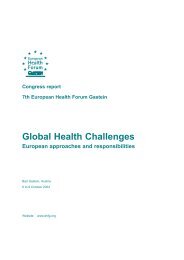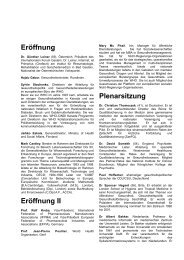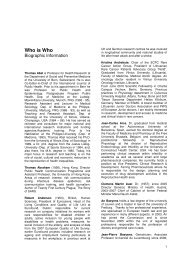Congress report - European Health Forum Gastein
Congress report - European Health Forum Gastein
Congress report - European Health Forum Gastein
Create successful ePaper yourself
Turn your PDF publications into a flip-book with our unique Google optimized e-Paper software.
270<br />
<strong>European</strong> <strong>Health</strong> <strong>Forum</strong> <strong>Gastein</strong> 2001<br />
2. Patient mobility and mutual influences on each other's systems<br />
According to the established policies of the <strong>European</strong> Union with respect to the area of<br />
health care, there is no direct interference of the Union in the definition of a national health<br />
care system. However, since there are differences both in financing and delivery of health<br />
care in different existing member states, there is a question whether such an approach is<br />
viable in the future. The famous Kohl and Dekker cases have triggered many questions that<br />
arise from the conflict between an open and free market approach pursued by some and the<br />
integrity of own national health care systems with their specifics. There is a danger that there<br />
might be too much 'outflow' of patients to more developed member countries and a net<br />
'deficit' of patients in the domestic health care.<br />
3. Internal health care markets<br />
Markets have become a much more important issue and a revival of the old business<br />
principles for all the accession countries following the political and social processes leading<br />
to transition. In health care that line of thinking has led to a shift from a more public health<br />
oriented system (even if often poor on resources) to a more service and production oriented<br />
one. That in itself should not be that bad if it were not followed by a shift towards more<br />
purely curative services.<br />
4. Opening of health care markets and international competition<br />
That dilemma leads to another important and closely related issue and that is the health<br />
markets. The accession countries might find themselves at the challenge of not being able to<br />
compete with the health care facilities of the neighbouring member states. Assistance in<br />
accreditation procedures and their standardisation seem to be rather important in that sense,<br />
otherwise, the accession countries might find another obstacle to their more active presence<br />
on the <strong>European</strong> health care market.<br />
5. Defining the common minimum package<br />
It is becoming increasingly difficult to define a common minimum package.<br />
Comprehensiveness of health care needs to be preserved in spite of the efforts to make it<br />
competitive and more market oriented. A regulation that would somehow standardise the<br />
minimum of care provided by a certain country therefore, seems warranted. If such a<br />
provision is not made, there might be gradually a wider variation in the type, extent and<br />
quality of services provided across different countries. That would effectively potentially<br />
worsen the existing inequities and inequalities within Europe. Both quantity and quality of<br />
publicly financed services would be at stake then.<br />
Slovenia's own views<br />
Slovenia sees both challenges and opportunities in view of the accession to the <strong>European</strong><br />
Union.<br />
Challenges are related to:<br />
- opening of borders and free movement of workforce and patients<br />
- broader and more demanding health care market<br />
Opportunities are in:<br />
- more professional development and research<br />
- offering own facilities on the health care market (especially certain medical<br />
specialities)<br />
Slovenia has a quickly ageing population (both bottom-up as well as top-down). That will<br />
certainly increase the demand for certain types of health care (e.g. long-term care, increases<br />
in chronic diseases prevalence and incidence rates). Communicable diseases are well<br />
International <strong>Forum</strong> <strong>Gastein</strong>, Tauernplatz 1, A-5630 Bad Hofgastein<br />
Tel.: +43 (6432) 7110-70, Fax: Ext. 71, e-mail: info@ehfg.org, website: www.ehfg.org


